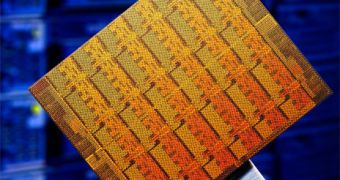Following rumors of Apple planning to acquire yet another chip maker, several reports now confirm the move, with Apple spokesperson Steve Dowling issuing an official statement to Bloomberg. The spokesperson did not provide any specifics, but did confirm the transaction, statesman.com relates.
The report in question talks about Intrinsity’s achievements, citing a number of analysts who justify the move for Apple, saying the P.A Semi acquisition did not work out as planned. Intrinsity is known to have designed key portions of Samsung Electronics Co. Ltd.'s low-power "Hummingbird" microprocessor. Formally introduced last year, the Hummingbird chip is actually the basis for Apple's A4 processor, several industry analysts believe. The A4 chip powers Apple’s iPad, the newest gadget from Cupertino.
Originally, however, the Hummingbird chip was based on a basic design from ARM Ltd. What Intrinsity did was redesign key circuits of the chip, enabling it to run faster and on lower voltage. "‘The acquisition is both to improve Apple's product line and to deprive potential competitors of Intrinsity's’ intellectual property, said analyst Will Strauss with Forward Concepts of Tempe, Ariz," the report also informs. As if it wasn’t already clear as daylight, Strauss says he expects Apple to incorporate Intrinsity-designed chips in the next generation of iPhones and other portables.
Backing Strauss’ claims, fellow analysts chime in to say that Apple’s move suggests loss of faith in P.A Semi, the chip-design startup Apple acquired in 2008 for $278 million. The situation doesn’t look good for Apple’s plans in the long run, analysts suggest, as several of the top executives coming aboard at the time have since fled to start their own business.
Interesting enough, Intrinsity CEO Bob Russo did not confirm the sale. He did say that his company had been able to rise from the ashes, thanks to its talented engineers. His exact words were, "Here is a company that five years ago is on the verge of disappearing from the face of the planet. Five years later, it comes out with the best processor in the world in the mobile space." "To come from that to having chips in the premier products on the planet is a pretty major accomplishment for a little company. There wasn't anybody around that could do the things this company did."

 14 DAY TRIAL //
14 DAY TRIAL //